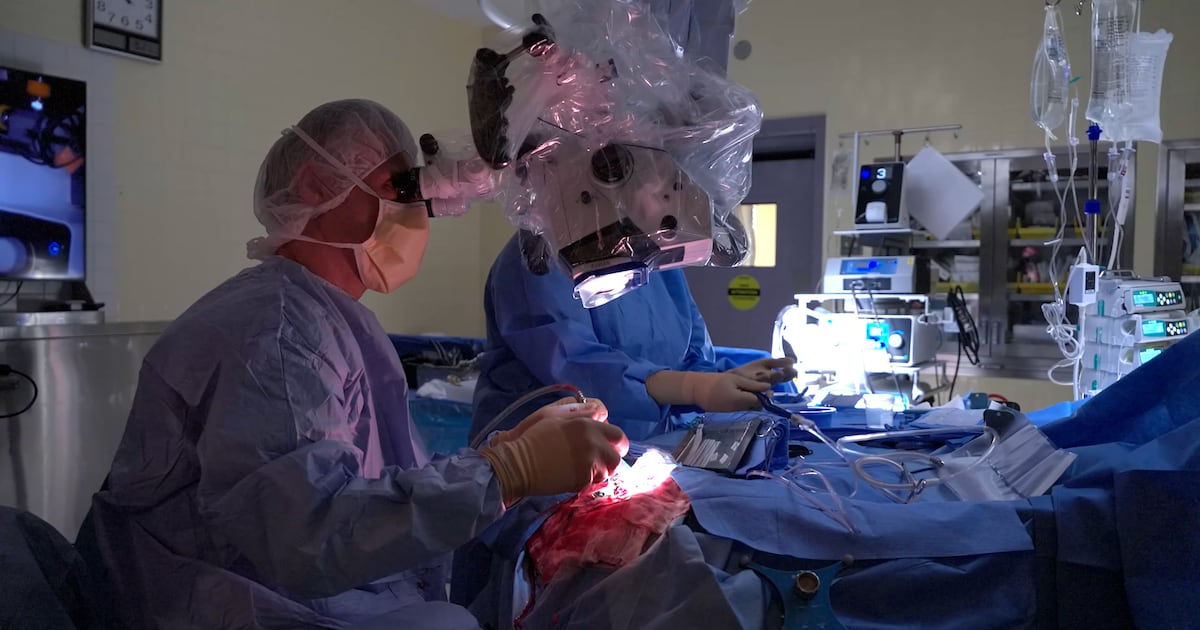Science
Montreal’s AI-Powered Device Offers New Hope for Cancer Patients

A groundbreaking surgical device developed in Montreal is transforming cancer treatment and extending the lives of patients diagnosed with brain tumors. This innovation, known as SENTRY, utilizes artificial intelligence to distinguish between cancerous and healthy tissue, and has already made a significant impact on the lives of many, including Peter Ross, who was given just 14 months to live almost four years ago.
Ross’s journey took a positive turn after he was referred to Dr. Kevin Petrecca, a surgeon at Montreal Neuro and co-founder of SENTRY. The device has shown impressive accuracy in identifying tumors. According to Petrecca, “98.7 per cent of the time, if it says it’s tumor, it’s tumor.” He further emphasized the reliability of the device, stating, “if it says normal brain, it’s normal brain 100 per cent of the time.”
SENTRY’s functionality is crucial since cancer cells are often not visible to the naked eye or detectable through conventional technologies. The device enables surgeons to remove a greater amount of tumor tissue than ever before. “You make contact with the spot, and you will get feedback within less than three seconds if it contains tumor cells or not,” Petrecca explained.
The implications of using SENTRY during surgery are profound. Petrecca noted that patients can expect to live two to five times longer than initially anticipated when the device is integrated into their surgical procedures. While primarily tested in brain surgeries, SENTRY also shows promise in detecting cancer in other areas such as the breast and lungs.
Ross participated in clinical trials involving SENTRY, and he expressed gratitude for the additional time he has gained. “I take every extra day that’s given to me to go out and walk, and just enjoy life because I owe that to this surgery,” he said. His wife, Sandrine Menard, echoed his sentiments, stating, “It’s given me, the rest of my life. I keep pinching myself. Wow. He’s still here.”
As SENTRY continues to demonstrate its effectiveness, the next crucial step is securing approval from the FDA. A pivotal trial is scheduled for May 2024, and both Ross and Petrecca hold hope that this medical advancement will soon help even more patients achieve remarkable milestones in their lives.
The development of SENTRY not only exemplifies the potential of artificial intelligence in medicine but also highlights the significant strides being made in the fight against cancer. For patients like Ross, this innovation represents a second chance at life, a chance to celebrate moments that were once thought to be out of reach.
-

 Education3 months ago
Education3 months agoBrandon University’s Failed $5 Million Project Sparks Oversight Review
-

 Science4 months ago
Science4 months agoMicrosoft Confirms U.S. Law Overrules Canadian Data Sovereignty
-

 Lifestyle3 months ago
Lifestyle3 months agoWinnipeg Celebrates Culinary Creativity During Le Burger Week 2025
-

 Health4 months ago
Health4 months agoMontreal’s Groupe Marcelle Leads Canadian Cosmetic Industry Growth
-

 Science4 months ago
Science4 months agoTech Innovator Amandipp Singh Transforms Hiring for Disabled
-

 Technology3 months ago
Technology3 months agoDragon Ball: Sparking! Zero Launching on Switch and Switch 2 This November
-

 Education3 months ago
Education3 months agoRed River College Launches New Programs to Address Industry Needs
-

 Technology4 months ago
Technology4 months agoGoogle Pixel 10 Pro Fold Specs Unveiled Ahead of Launch
-

 Business3 months ago
Business3 months agoRocket Lab Reports Strong Q2 2025 Revenue Growth and Future Plans
-

 Technology2 months ago
Technology2 months agoDiscord Faces Serious Security Breach Affecting Millions
-

 Education3 months ago
Education3 months agoAlberta Teachers’ Strike: Potential Impacts on Students and Families
-

 Science3 months ago
Science3 months agoChina’s Wukong Spacesuit Sets New Standard for AI in Space
-

 Education3 months ago
Education3 months agoNew SĆIȺNEW̱ SṮEȽIṮḴEȽ Elementary Opens in Langford for 2025/2026 Year
-

 Technology4 months ago
Technology4 months agoWorld of Warcraft Players Buzz Over 19-Quest Bee Challenge
-

 Business4 months ago
Business4 months agoNew Estimates Reveal ChatGPT-5 Energy Use Could Soar
-

 Business3 months ago
Business3 months agoDawson City Residents Rally Around Buy Canadian Movement
-

 Technology2 months ago
Technology2 months agoHuawei MatePad 12X Redefines Tablet Experience for Professionals
-

 Business3 months ago
Business3 months agoBNA Brewing to Open New Bowling Alley in Downtown Penticton
-

 Technology4 months ago
Technology4 months agoFuture Entertainment Launches DDoD with Gameplay Trailer Showcase
-

 Technology4 months ago
Technology4 months agoGlobal Launch of Ragnarok M: Classic Set for September 3, 2025
-

 Technology4 months ago
Technology4 months agoInnovative 140W GaN Travel Adapter Combines Power and Convenience
-

 Science4 months ago
Science4 months agoXi Labs Innovates with New AI Operating System Set for 2025 Launch
-

 Top Stories2 months ago
Top Stories2 months agoBlue Jays Shift José Berríos to Bullpen Ahead of Playoffs
-

 Technology4 months ago
Technology4 months agoNew IDR01 Smart Ring Offers Advanced Sports Tracking for $169










